LATEST NEWS


Currently a Research Professor of Education at New York University, Diane Ravitch served as the Assistant Secretary of Education in the George H.W. Bush administration and later worked for Bill Clinton’s White House. A tireless critic of the public school testing standards she once endorsed, the 75-year-old Ravitch remains a clear voice against the stampede into publicly funded charter schools and other right-leaning education “reforms,” including No Child Left Behind and Race to the Top.
Her newest book is Reign of Error: The Hoax of the Privatization Movement and the Danger to America’s Public Schools. Tonight and tomorrow night she will speak at two Southland colleges as part of her book tour.
Tuesday, October 1, 7 p.m.
Thorne Hall. Occidental College
1600 Campus Road, Los Angeles
(323) 259-2991
Free.
Wednesday, October 2, 7 p.m.
Student Union,California State University
18111 Nordhoff St.,
» Read more about: Diane Ravitch Speaks at Two Southland Colleges »


Union organizing could suffer a devastating blow by the U.S. Supreme Court this term.
In November, justices hear a case on labor-management “neutrality pacts” — agreements which spell out each side’s role in organizing. Usually, this means employers are barred from engaging in overt anti-union practices and accept some form of “card check” certification.
Unions use neutrality pacts to reduce the legal entanglements and employer intimidation that have become widespread in National Labor Relations Board-supervised elections.
After years of struggle, UNITE HERE, for example, recently pressured Hyatt Hotels to accept neutrality terms. And unions in Los Angeles, when possible, make such deals in return for support of large development projects.
It’s been a bad decade (and a bad half-century) for the American labor movement:
Union membership percentages continuing to slide, states restrict public sector bargaining and right-to-work laws have spread.
The case before the Court is technical and may not produce a sweeping ruling.


“Will Work for Food.” How many times do we see these signs at most every street corner? For those of who are federal employees and who are also union representatives and officers, the time seems to be right for us to get out our Sharpies and make our own signs.
The last several years have seen my sisters and brothers in Social Security and other agencies continually being threatened with shutdowns and furloughs as a result of the lack of federal budgets or continuing resolutions, failure to raise the debt ceiling as well as the fiscal cliff. Now as of October 1, 2013 we are going to be shut down again.
In 1995, Social Security employees such as myself were called “non-essential” and sent home. After a press blitz, we were called at home told we were essential and should come back to work —


Those of us who grew up in public school systems were taught two indelible but contradictory lessons. One, from civics classes, was that laws are created (and government run) according to the necessities of compromise. (The reason politics is called the art of the possible.) The other, drilled into us by history instructors, reminded us of the evils of compromising with fanatics. (The endless Sudetenland analogies we sat through.)
But these two lessons never held equivalent weight because while we could see compromise all around us, history was for other countries. The Atlantic’s James Fallows, happily, has pointed out the error of that thinking in a couple of recent online pieces about the pending government shutdown. His thesis, basically, is that the media have it all wrong in their reporting on the shutdown (which could come tomorrow, October 1) and the even more troubling likelihood of a debt default (see how much your 401(k) is worth in two weeks).
» Read more about: Tea Party Over Country: Why the Shutdown Is Coming »
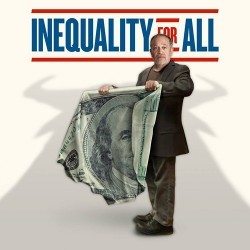

With the release of the documentary Inequality for All, the core progressive story about what is wrong with the economy is now on the silver screen. For those of us who have been working to articulate what we call a progressive economic narrative, it is a major milestone.
The right spent decades projecting their view that prosperity is created through limited government and free markets, concepts that still dominate most Americans’ thinking, even as the American dream is becoming a nightmare for more and more families. The new movie provides a powerful way to popularize a very different story.
Inequality for All is based around a big lecture course that Robert Reich gives at the University of California Berkeley. Reich and the film’s director, Jacob Kornbluth, mix facts, infographics, documentary footage and profiles of families whose lives have been scarred by the new economy with the personal story of Reich’s lifelong work to push for a just economy,


At the 1992 Republican National Convention, then Vice Presidential nominee Dan Quayle summed up his thoughts on taxing those with greatest wealth at higher rates with the line, “Why should the best people be punished?” This rare candor spotlights the beliefs still central in today’s economic policymaking.
Last week, House member Kevin Cramer (R-ND) invoked scripture to justify taking food from the mouths of babes, saying “If anyone is not willing to work, let him not eat.” His colleague, Rep. Steve Southerland (R-FL) similarly declared, “work is a blessing.” Clearly, the economy is intended as far more than an aggregation of what we produce, purchase, consume and invest. We’re meant to see it as an instrument to impose a particular morality: to reward the good and punish the naughty.
Republicans would go further and have us believe the economy is an angry and vengeful God.
» Read more about: Holy Hypocrites: Why Conservatives Punish the Poor »
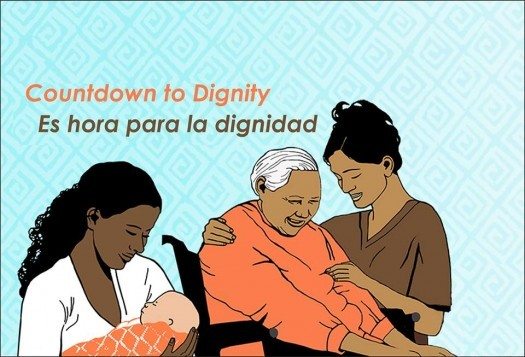
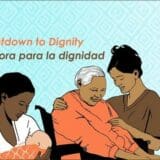
Domestic workers in California — and groups and people who support better employment conditions for them nationwide — are hailing a new bill of labor rights signed into law Thursday in Sacramento.
The signing of AB 241 ensures that domestic workers in private homes are paid overtime for the hours they work.
The law goes into effect on January 1, a year before similar but federal regulations announced this month begin, California state Assemblymember Tom Ammiano said in a statement. He is the main author of the bill.
“This is a big step for respecting and recognizing domestic work as real work, and the fight doesn’t stop here,” Marcela Escamilla, a San Francisco domestic worker, said in a statement released by Mujeres Unidas y Activas.
“The fire for this movement will now burn brighter for domestic workers across the country fighting for the same recognition.”
Mujeres Unidas y Activas,
» Read more about: State’s Domestic Workers Celebrate O.T. Law »


As anyone thinking about enrolling in a college or university knows, tuition is not cheap. The National Association of Student Financial Aid Administrators (NASFAA) notes that since the early 1980s, tuition has risen by approximately seven percent a year, causing two-thirds of students to borrow to complete their degrees. Although grants and outright scholarships exist, part of the problem, NASFAA’s website explains, is that “in 1975 the states picked up 60 percent of the tab while families shouldered 33 percent” and the federal government picked up the balance. Thirty-eight years later, the states pay approximately 34 percent and the feds pay 16 percent, leaving students and their families to shell out – often through loans – the remaining half.
And it’s getting worse. According to the Center on Budget and Policy Priorities, since the start of the recession in 2008, “cuts to higher education have been severe and almost universal.”
» Read more about: Tuition Woes Hurting Women Students More »


In a new report, University of Southern California professor and warehousing and logistics expert Juan D. de Lara reveals that the local warehousing industry is relying on low-paid, temporary workers at serious risk to the ongoing economic health of the region.
De Lara takes a closer look at labor and census statistics to unpack actual warehouse worker wages.
“It should be clear that most blue collar warehouse workers earn far less than the average logistics annual wage of $45,000,” De Lara writes in Work: Path to the Middle Class or Road to Economic Insecurity?, released by USC’s Program for Environmental and Regional Equality. “Any conversation about the future of the logistics industry as a key driver in the Inland Empire’s regional economy should begin with an honest assessment of blue-collar vs. white collar wages.”
While the average logistics wage is often taken at face value,
» Read more about: USC Report: Low Wages Damaging Inland Empire Economy »


In a move to slash the retirement benefits of public employees in California, a group of mostly conservative policy advocates has been working behind the scenes on a possible 2014 ballot initiative. A copy of the still-secret draft initiative, which could dramatically impact the lives of hundreds of thousands of Californians and send a signal nationwide, has been obtained by Frying Pan News. (See the document’s text following this article or click here.)
If enacted, the proposed law would allow the state and local governments to cut back retirement benefits for current employees for the years of work they perform after the changes go into effect. Previous efforts to curb retirement benefits for public employees have largely focused on newly hired workers, but the initiative would shrink pensions for workers who are currently on the job.
“This initiative defines that a government employee’s ‘vested rights’ only applies to pension and retiree healthcare benefits earned for service already rendered,
» Read more about: Exclusive: Pension-Cutting Ballot Initiative Revealed »
It is 3 p.m., June 27, 2013 and I find myself walking on the sidewalk along Pacific Coast Highway in Newport Beach. Just like any other day in Southern California, the skies are blue, the sun is bright gold and the owners of new BMWs, Mercedes Benzes and Maseratis speed down the highway without a care in the world. Unlike any other day, I find myself among a delegation of community members, clergy, reporters and union representatives in support of Joe Dickson and his co-workers.
We march towards the elegant Newport Beach Balboa Bay Country Club to speak with Alireza Mahdavi before he gives a speech to a group of investors and financiers at a convention. We certainly did not pay $900 to have some alone time with the CEO of American Logistics International; I don’t think any of us have that kind of money to spend on a chicken dinner alone.
» Read more about: Alireza Mahdavi: Come Out, Come Out Wherever You Are! »


On ABC’s This Week, Newt Gingrich and I debated whether House Republicans should be able to repeal a law — in this case, the Affordable Care Act — by de-funding it. Here’s the essence:
GINGRICH: Under our constitutional system, going all the way back to Magna Carta in 1215, the people’s house is allowed to say to the king we ain’t giving you money.
REICH: Sorry, under our constitutional system you’re not allowed to risk the entire system of government to get your way.
Had we had more time I would have explained to the former Speaker something he surely already knows: The Affordable Care Act was duly enacted by a majority of both houses of Congress, signed into law by the President, and even upheld by the Supreme Court.
The Constitution of the United States does not allow a majority of the House of Representatives to repeal the law of the land by de-funding it (and threatening to close the entire government,
» Read more about: GOP’s Defunding Mania: Instant Constitutional Crisis »
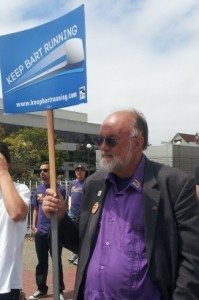

Negotiating a fair contract is a complex process that involves hard work and commitment from both labor and management. When both sides bargain in good faith and share a goal of securing a deal, a deal eventually gets done. I’ve personally been involved in many tough negotiations that ended with a fair deal that both parties could live with. It takes patience and willingness from both sides to compromise.
In the BART [Bay Area Rapid Transit] negotiations, unfortunately, that hasn’t been the case. BART management paid Thomas Hock, an out-of-state lawyer with a history of driving disputes to a strike, nearly $400,000 to lead negotiations. Hock and his company have been responsible for seven strikes, 47 unfair labor practice charges and nine discrimination lawsuits. Not exactly a history of committing to compromise in order to secure a deal.
True to form, Hock hasn’t been serious about negotiating a resolution at BART that would spare the Bay Area a strike.
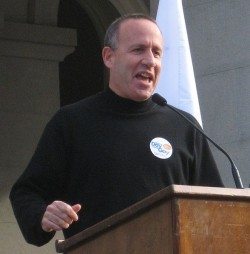
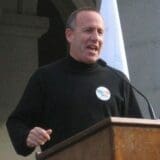
California’s relationship with redevelopment just got more complicated, now that state Senate President Pro Tem Darrell Steinberg (D-Sacramento) has temporarily withdrawn SB 1.
Steinberg had fought hard for his personally authored bill, which would have replaced California’s old system of community redevelopment agencies (CRAs), which were dissolved in 2011, with Sustainable Community Investment Authorities. Yet as the legislature’s fall session began, he calculated there was a strong possibility of Governor Jerry Brown vetoing the measure. (Last year Brown vetoed SB 1156, an earlier incarnation of Steinberg’s legislation.)
Steinberg withdrew the bill September 12, just as SB 1 was headed back to the Assembly for further discussion.
SB 1’s tactical withdrawal puts on hold the hopes of cities to build healthy, sustainable economies. Despite occasional planning mistakes made by some CRAs in the past, there is still an urgent need for rational urban planning that benefits all communities,
» Read more about: Redevelopment Measure SB 1 Temporarily Withdrawn »


When Kentucky’s legislature adopted a bill intended to transform the Bluegrass State’s troubled pension system last spring, state officials were ecstatic. Signing the bill into law on April 4, Democratic governor Steve Beshear hailed it as groundbreaking legislation that would “solve the most pressing financial problem facing our state – our monstrous unfunded pension liability and the financial instability of our pension fund.”
Not everyone was convinced.
Critics, who include pension-fund experts, lawmakers and AARP Kentucky, claim the new law will hurt workers, taxpayers and retirees. What’s more, they say the law was largely crafted behind the scenes by an unusual alliance between two out-of-state organizations: the Pew Center on the States and the Laura and John Arnold Foundation. Some detractors go further and assert that the Arnold Foundation is using Pew’s sterling reputation for academic integrity as a fig leaf to hide its own free-market agenda.
» Read more about: Promise Breakers: How Pew Trusts Is Helping to Gut Public Employee Pensions »


for at least an hour. Maybe longer. It was longer.
No one spoke, looked away, or drew attention
with their hands. A few of us opened our mouths,
a few always do. We didn’t know we’d done it.
No one saw. Like losing a button. We were busy
not speaking. We had drinks, a few snacks, watched
TV with the sound off. A few of us thought about
the button, the one that says MUTE, how common
it is now. We tried to imagine it on other things,
things that don’t speak but are loud: lamps, guns,
a fire truck with MUTE painted on it. It would’ve
looked good on us, stenciled white across our chests.
We wore dark colors, earth tones. No one calls them
dirt tones or soil.
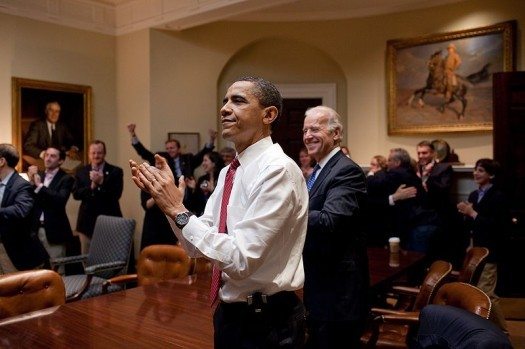

It’s been 100 years since ideological conservatives joined with doctors and insurance companies to kill the first movement in the United States for what was then called “compulsory health care.” Now, on the eve of their epic loss, those who deeply hate the idea that we have a collective responsibility to care for each other are desperately trying to stop history’s clock.
Beneath the tested rhetoric from opponents like the Heritage Foundation and Texas Senator Ted Cruz about a government takeover or Obamacare killing jobs and the economy, we can find expressions of the driving force behind the right’s obsession. One telling quote is from Missouri State Senator Rob Schaaf, who declared, “We can’t afford everything we do now, let alone provide free medical care to able-bodied adults.” Another is the proud statement from Steve Lonegan, the Republican candidate for U.S. Senate in New Jersey, who told me in a debate on Obamacare at the FDR Library,
» Read more about: In Sickness and In Health: Defending Obamacare »


My name is Dana Wilson and I am a professional dancer. Whether I am performing with a major recording artist, or busting a move in television and film, it is my job to entertain and evoke emotion through movement. It is also my job to make it look easy.
The reality is, dancers train tirelessly, sacrifice our bodies and dedicate our lives to our work, and sometimes all we get in return is “the experience.” Most of us are young (twenty-somethings) and female. We are all are eager to work and it has taken a long time to gain respect as a work force. We have unions that represent us when we work on television shows and movies, but much of our work is still nonunion and many of us are without health insurance. Meanwhile, our bodies are taking a beating and we are always one injury away from unemployment.
Dancers’ Alliance is an organization formed by dancers and run by dancers to unite us and improve our working conditions.


Social justice activists often think that when things are terrible, people will rise up and protest those conditions until they see significant change, and sometimes they do. But usually, especially in recent decades in this country, they don’t. My friends, as well as other readers of the Frying Pan, often ask, Why not?
I always return to one of the classic analyses of dramatic social change, Crane Brinton’s Anatomy of Revolution. The book follows the trajectory of four historic revolutions: England, France, America and Russia. In each, he argues, regime change did not happen because conditions were at their worst. Instead they occurred when the circumstances of everyday life were actually getting better but did not match the hopes of people. Revolution happened, Brinton says, in the widening gap between expectation and reality.
That explanation probably clarifies why demonstrations in Greece and Spain have met with frustration,


Out of 300 million Americans, a few thousand wield disproportionate economic and political influence because of their positions at the pinnacle of America’s corporate and media establishments or their roles as political allies (or puppets) of the corporate ruling class. C. Wright Mills described this group in his 1956 book, The Power Elite; G. William Domhoff has updated this analysis in his book, Who Rules America? (now in its seventh edition), and Jacob Hacker and Paul Pierson have described how the power elite wields its influence in Winner-Take-All Politics.
Many of them have overlapping memberships on the boards of the largest corporations, business lobby groups, universities and think tanks, foundations and media conglomerates. They are not part of a conspiracy. They do not meet secretly to plot America’s future. And they do disagree with each other on some issues,
» Read more about: Dinner for 20 Schmucks: An Elite Hall of Shame »